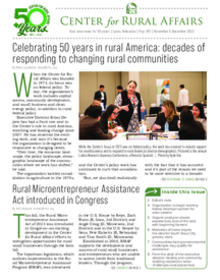Editor’s note
Early in September, the Center held a celebration for our 50th anniversary. At events like these, I look around and realize our organization’s impact. Attendees ranged from 3 months to near 90 years. I heard laughter, conversation beginning with “do you remember when…,” shrieks from kids (who found new friends and kittens), and best of all, received hugs and heard stories from all of you.
We listened to speeches from Julia Kleinschmit who interned at the Center and whose dad worked here for many years, Wyatt Fraas who has dedicated his career to the Center, and from Connie Hansen who is a long-time donor and former board member alongside her husband, David. (Speeches can be found at cfra.org/blog)
Barbara Dilly, board member, even wrote a song commemorating our 50 years, “We are rural America.” We’ll soon have a video up on our YouTube channel.
In the last month, we premiered a film, “Center for Rural Affairs: Celebrating 50 Years of Community Empowerment” featuring interviews with Board President Dennis Demmel, Executive Director Brian Depew, and program directors. Check it out on YouTube: youtube.com/c/CfraOrg
-Rhea Landholm
In this edition
Celebrating 50 years in rural America: decades of responding to changing rural communities: When the Center for Rural Affairs was founded in 1973, its focus was on federal policy. Today, the organization’s work includes capital access, community development, and small business and clean energy policy, in addition to rural federal policy.
Rural Microentrepreneur Assistance Act introduced in Congress: This fall, the Rural Microentrepreneur Assistance Act of 2023 was introduced in Congress—an exciting development in the Center for Rural Affairs’ efforts to strengthen opportunities for rural small businesses through the farm bill.
From the desk of the executive director: healing and community building required to solve challenges rural places face: Throughout my last essay I wrote about why access to capital—who can get money and what they are able to do with it—is central to rural communities and central to the Center’s work.
Organization to begin training Native American women for solar careers: There’s a strong belief in honoring the sun in the Lakota culture. “If you don’t have the sun shining, you can’t have plants and flowers and photosynthesis,” said John Red Cloud, a member of the Oglala Lakota Nation. “It’s responsible for all of life.”
Organic producer shares experiences, love of the land with beginning Latino farmers: Justin Jones has been intrigued by the land around him since he was a child, and he continues to learn from it to this day.
Memories of home inspire the idea for South Sioux City grocery store: Before settling in South Sioux City, Nebraska, Alejandro Macias grew up in San Julian, Jalisco, Mexico. His mother owned a pharmacy there and sold a wide variety of items along with medications and pharmaceutical products.
Communities facing environmental challenges may qualify for assistance: Rural communities in Nebraska and across the Midwest have a new resource for assistance in addressing environmental challenges: the Heartland Environmental Justice Center (HEJC), a Thriving Communities Technical Assistance Center.
Would you like to receive the newsletter in print or online? Sign up here.


